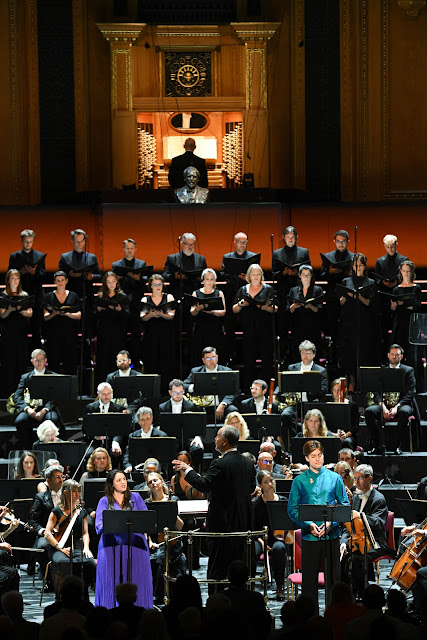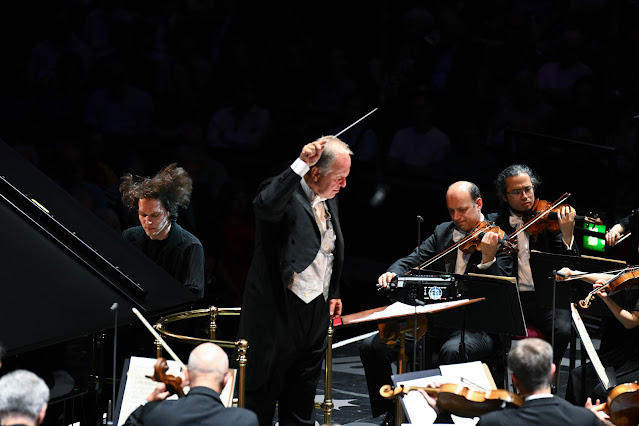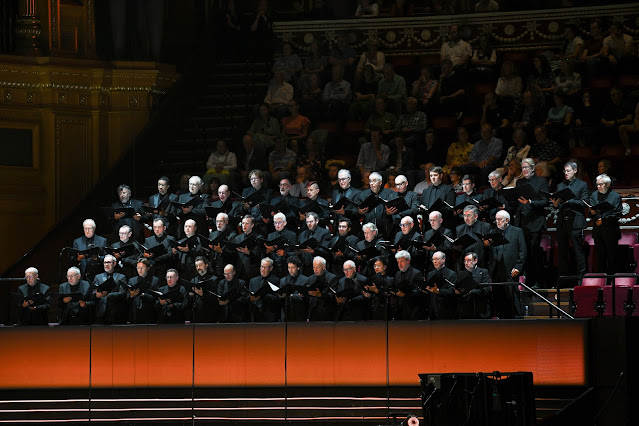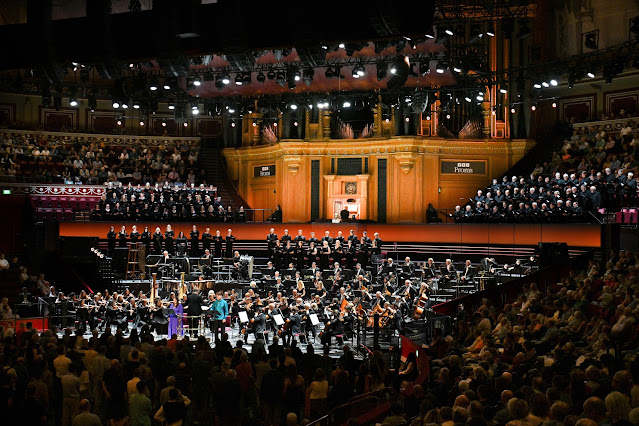 |
| Bliss: The Beatitudes – Elizabeth Watts, Laurence Kilsby, BBC Symphony Orchestra, BBC Singers, Sakari Oramo BBC Proms (Photo: Chris Christodoulou/ BBC) |
Ruth Gips: Death on the Pale Horse, Grieg: Piano Concerto, Bliss: The Beatitudes; Elizabeth Watts, Laurence Kilsby, Lukas Sternath, BBC Symphony Orchestra, BBC Symphony Chorus, BBC Singers, Sakari Oramo; BBC Proms at the Royal Albert Hall
Reviewed 7 September 2025
Bliss’ powerful war-inspired cantata, written for the consecration of Coventry Cathedral and Ruth Gips’ 1943 tone-poem with Grieg’s concerto as a somewhat unlikely make-weight
Some works recover from a disastrous premiere whilst others simply disappear. Sir Arthur Bliss’ large-scale choral cantata The Beatitudes was written for the consecration of Coventry Cathedral in 1962 alongside Britten’s War Requiem. Logistics (and perhaps a bit of politicking) meant the premiere of Bliss’ piece being bumped to the unsatisfactory Belgrave Theatre. The Beatitudes was performed at the BBC Proms two years late in 1964, but it took until 2012 for it to be finally performed in Coventry Cathedral.
On Sunday 7 September 2025, Bliss’ The Beatitudes returned to the BBC Proms alongside another British work arising from the Second World War, Ruth Gips’ Death on a Pale Horse. Rather curiously, Grieg’s Piano Concerto was sandwiched in the middle and at least one couple in the audience, having listened attentively to the Grieg seem to have decided that the Bliss was not worth returning for.
Sakari Oramo conducted the BBC Symphony Orchestra, BBC Singers and BBC Symphony Chorus with Lukas Sternath as soloist in Grieg’s Piano Concerto and soprano Elizabeth Watts and tenor Laurence Kilsby as soloists in Bliss’ The Beatitudes.
 |
| Grieg: Piano Concerto – Lukas Stenrath, BBC Symphony Orchestra, Sakari Oramo – BBC Proms (Photo: Chris Christodoulou/ BBC) |
Gips was inspired by William Blake’s watercolour, Death on a Pale Horse (from around 1800) depicting two of the Four Horseman of the Apocalypse. Gips’ tone poem Knight in Armour had been conducted by Sir Henry Wood at the Last Night of the 1942 Promenade Concerts, and Death on the Pale Horse followed the following year.
It opened with a restless theme on the horns, then taken up by the orchestra, leading to a dialogue which contrasted the slow lyricism of the horns with the more lively orchestral contributions. Gips developed this engagingly leading to an unashamedly romantic climax, before the atmosphere darkened and the music evoked some of RVW’s more angsty symphonic utterances. Overall the work was less intense than I had expected, and felt more like a character study with darker moments.
It is perhaps worth remembering quite how ground-breaking Grieg’s Piano Concerto was when it was written in 1868. Schumann’s Piano Concerto was a little over 20 years old and the 1850s had seen both Liszt’s concertos and Brahms’ first, but Brahms’ second and Tchaikovsky’s Piano Concerto were in the future and it could be said that the romantic piano concerto was still in its infancy. This work apart, Grieg never became known for large-scale forms and he was understandably uncertain about the concerto.
Austrian pianist Lukas Sternath (born in 2001) was making his Proms debut and he is a BBC New Generation Artist from 2025 to 2027. He and Sakari Oramo took a rather Schumann-esque approach to the concerto, highlighting Grieg’s Germanic training rather than Nordic lyricism and freshness. After the high drama of the opening gesture, it was relaxed intimacy that was to the fore with both Oramo and Sternath really slowing the second subject down. Sternath made an engaging soloist, well able to mix drama, virtuosity and lyricism but there were perhaps too many moments of self indulgence. His cadenza veered more towards Big Romantic Concerto than bracing Norwegian air. The slow movement had its beauties but was too slow and too self-conscious for my taste. We did get the feeling of Norwegian dance in the finale, with some superbly cool flute playing. The intimate dialogue between soloist and orchestra was again perhaps too much and certainly Oramo made a big thing of the final incarnation of the big orchestral tune.
Sternath’s performance was well-received by the audience and we were rewarded with an encore. Max Reger’s transcription of Strauss’ song Morgen. In a way, quite a ballsy choice.
 |
| Bliss: The Beatitudes – men of the BBC Symphony Chorus – BBC Proms (Photo: Chris Christodoulou/ BBC) |
For the text of The Beatitudes Bliss collaborated with Christopher Hassall (lyricist for Ivor Novello and librettist to Walton’s Troilus and Cressida) and the interspersed the Biblical text with texts by 17th century metaphysical poets, Henry Vaughan, George Herbert and Jeremy Taylor, plus Dylan Thomas. Throughout the work, Bliss sets the beatific vision alongside a mood of violence.
The prelude, A Troubled World featured orchestral writing that was intense and jagged. This was Bliss at his most vividly cinematic. The setting of Henry Vaughan’s The Mount of Olives began with unaccompanied chorus and throughout the work you sensed Bliss’ care to ensure that the chorus had space to project the words. Alas, in the Royal Albert Hall the efforts of the BBC Symphony Chorus rather failed in this regard. This movement was all about the chorus, moving from touchingly intense to a strong conclusion.
A fanfare-like passage in the orchestra, something which reoccurred as punctuation throughout the work, led to the setting of the first and second Beatitudes. Bliss took a rhapsodic almost ecstatic approach to these. The first with soprano Elizabeth Watts and tenor Laurence Kilsby both high in their registers and singing with focus and lyrical intensity, the second with the BBC Singers as aethereal yet rhapsodic semi-chorus.
A large-scale setting of George Herbert’s Rise Heart (perhaps best known from RVW’s 1911 setting) featured chorus, orchestra and soloists with Bliss bringing real strength to the music with some vividly vigorous choral writing and rhapsodic solo passages. Yet there were intimate moments too, with unaccompanied choral passages and pared-down accompaniments for the soloists. The setting of Herbert’s I got me flowers mixed lyrical choral writing with a positively catchy orchestral accompaniment along with punctuations of rhapsodic alleluias from the soloists. By this time we were beginning to realise that Bliss used his soloists in only one way, but both Watts and Kilsby were both tireless and compelling in their performances.
A quietly intense orchestral passage led to Elizabeth Watt’s lyrically ecstatic account of the third Beatitude. Vigour and anger in the orchestra led to a choral setting of a text from Isaiah, ‘The lofty looks of man shall be humbled’ with Bliss’ writing being rhythmic and angular, except for the quietly eerie mystery of ‘for fear of the Lord’.
The fourth Beatitude featured both soloists and chorus singing with lyric intensity over a drone. The setting of Herbert’s The Call began with unaccompanied chorus and moved from the intimate to something stronger, with powerful harmonies, ending with an uncompromising hymn-like setting. A restless, vividly angular orchestral prelude was followed by the fifth, sixth, seventh and eighth Beatitudes, in a large-scale movement where each Beatitude featured the lyrical rhapsody of soprano, tenor and then both soloists echoed by chorus with the final Beatitude going to all performers and Bliss making the harmony here have a distinct edge to it, with the text referring to those persecuted for righteousness’ sake.
Bliss’ setting of Dylan Thomas’ And Death Shall Have No Dominion was powerful indeed, with orchestra and chorus performing with vigour, yet Bliss did not dwell and worked his way through the words remarkably speedily. The final, ninth Beatitude (‘when men shall revile you and persecute you’) was combined with the ‘Voices of the Mob’. The soloists’ ecstatic account of the Beatitude modified by edgy and angular harmonies, then the chorus projecting vivid anger in the ‘Voices of the Mob’
The Epilogue, O Blessed Jesu set words by Jeremy Taylor, moving from the quiet and tender through lyrical solo contributions, sometimes with the suggestion of a marching beat in the orchestra, and unaccompanied choir to all the forces, soloists, choir, orchestra and organ in a glorious Amen.
 |
| Bliss: The Beatitudes – Elizabeth Watts, Laurence Kilsby, BBC Symphony Orchestra, BBC Singers, BBC Symphony Chorus, Sakari Oramo – BBC Proms (Photo: Chris Christodoulou/ BBC) |
Bliss’ The Beatitudes is not an everyday work, but it is a large-scale chorus and orchestral setting that deserves more outings. Bliss does not quite achieve Britten’s ability to transcend his material and create something universal, but The Beatitudes is perhaps not trying to do that.
The blog is free, but I’d be delighted if you were to show your appreciation by buying me a coffee.
Elsewhere on this blog
- Angel of Peace: The Sixteen’s 25th Choral Pilgrimage moves from the 12th century to the present day – concert review
- BBC Proms: Two tempests, a fire and a swan, Thomas Adès conducts Sibelius, Gabriella Smith & his own music – concert review
- BBC Proms: Shostakovich’s Lady Macbeth from massed BBC & ENO forces but Amanda Majeski’s Katerina triumphs – opera review
- BBC Proms: Vital & involving, Peter Whelan & the Irish Baroque Orchestra in the Dublin version of Handel’s Alexander’s Feast – concert review
- Up close & personal: a pacey & vivid account of Mozart’s Don Giovanni from Ensemble OrQuesta at the Grimeborn Festival – opera review
- The Glyndebourne Prom: Mozart’s Le nozze di Figaro with a young cast on superb form – opera review
- Ravishing delight: Rebecca Meltzer tells the story of Handel’s Semele with engaging clarity at Waterperry Opera – opera review
- Salzburg Festival
- Astonishing kinetic musical theatre: Donizetti’s Maria Stuarda from Ulrich Rasche with Lisette Oropesa & Kate Lindsey – opera review
- Travelling hopefully: defying age & ill health, Daniel Barenboim conducts his West-Eastern Divan Orchestra – concert review
- Youthful tragedy & transcendental mystery: Riccardo Muti & Vienna Philharmonic Orchestra in Schubert & Bruckner – concert review
- Strange & intriguing: Dmitri Tcherniakov directs his first Baroque opera with Handel’s Giulio Cesare – opera review
- Home









